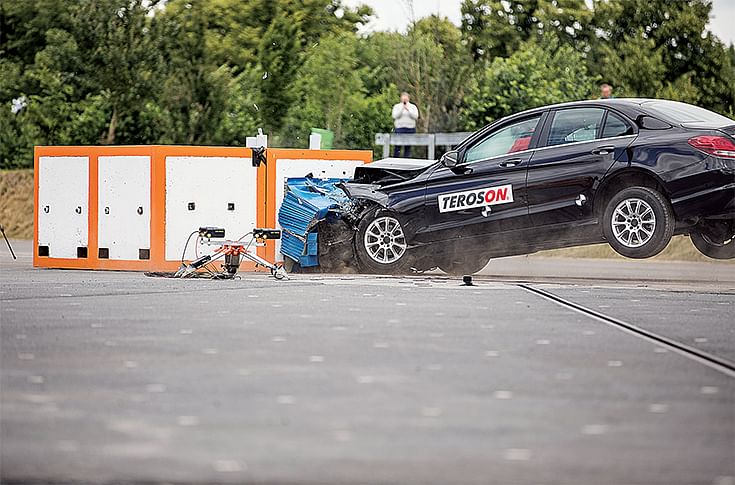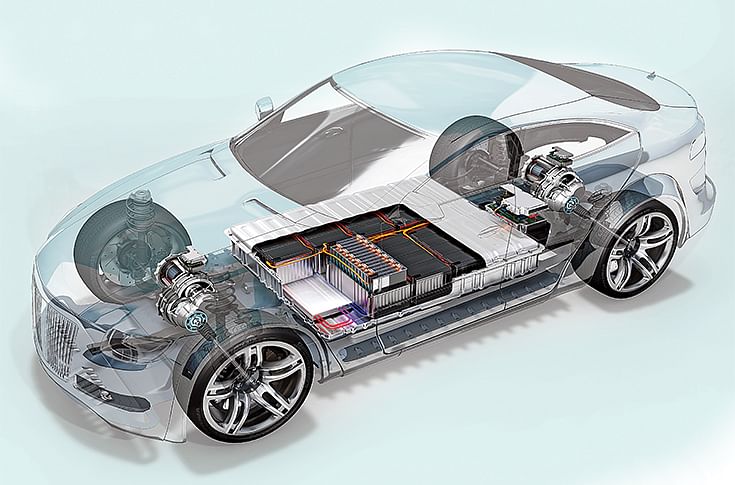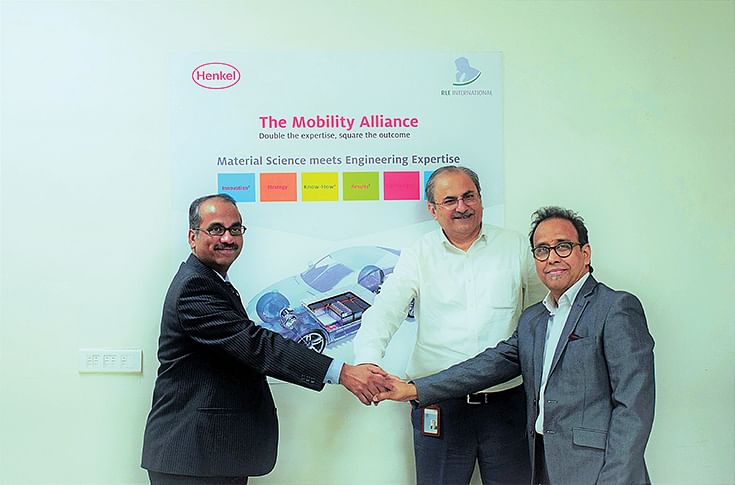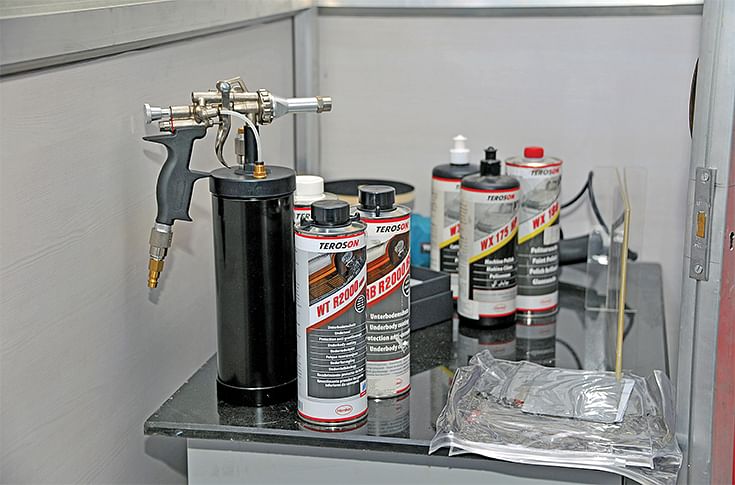Henkel and RLE bond to enhance vehicle safety
Henkel and RLE's mobility alliance will leverage each other's strengths in material science and engineering.
Henkel, whose high-performance adhesives and sealants allow OEMs to seamlessly combine load-bearing structural elements together, and RLE, one of the world’s leading development, technology and consultation service providers, have joined hands to make vehicles safer.
The automotive industry the world over is fully engaged in tackling the four disruptive megatrends of autonomous, connected, electric and shared mobility. What remains a constant though is its engagement with safety and sustainability.
Safety has tremendously evolved in the automotive context, wherein not just physics or mechanics but even concepts of chemistry today have started playing key roles in defining the structural and operational integrity of a vehicle. For instance, do you know that a car windshield re-fixed in hardly 30 minutes, can provide enough bonding with the metal to be able to survive a crash test conducted immediately afterwards?
Henkel's Teroson WT R2000 Aqua is a water-based coating product used for long-term underbody and spot repair tasks.
Vehicle engineers are now ingraining such characteristics into their designs and are venturing into the depths of material science, aiming to find better solutions to some of the critical problems being faced by the industry.
While stringent emission control norms demand high fuel efficiency which can be achieved by shedding weight, a consistent push on road safety also at the same time needs products to be durable and strong to remain intact and structurally composed in the event of an accident.
The aforementioned windshield experiment was successfully performed by Henkel, the 20 billion euro German chemical and consumer goods giant, which sees over 22 percent of its global business coming in from supplies of adhesives and substrates to the automotive industry. It has now partnered RLE International, the Cologne-based engineering excellence and solutions provider, to take this paradigm shift head-on and be collective enablers of swift progress to the automotive fraternity globally.

In a test in Germany last year, Henkel demonstrated the power and efficiency of its car repair solutions just 30 minutes after bonding the windscreen with Teroson PU 8730 HMLC. CTS experts simulated the frontal offset collision in line with EU new vehicle standards. The results showed that the windscreen bonded with Teroson adhesives not only withstood the extreme crash test conditions but also delivered the measured values required for the full functioning of the passenger airbag.
Leveraging strengths to enhance safety
Touted as ‘The Mobility Alliance’, the global partnership signed in November 2018, aims to leverage each other’s strengths in material science and engineering. It will jointly develop new solutions and technologies at platform level to enable weight reduction and safety enhancement in contemporary automotive products, be it electric vehicles, hybrids or just conventionally fueled vehicles needing to meet stricter emission norms by the virtue of lightweighting.
Henkel, with its over 50-year-old and renowned Loctite brand of sealants, epoxies and superglues, has its R&D centres strategically located in multiple global locations with specialised task forces conducting continuous research in material technology. Henkel operates in India through Henkel India, a wholly-owned subsidiary of Henkel and as Henkel Anand, its JV with the highly diversified Anand Group. Headquartered in Navi Mumbai, Henkel in India has a footprint comprising eight manufacturing sites, an innovation centre in Pune and a product development centre in Gurgaon.
RLE’s global network encompasses six other centres other than its Cologne HQ and has been catering to global OEMs like Ford and Mercedes-Benz in core design and engineering services since 1985.
While it has bases in the UK, USA, Iberia, China and Australia, in India RLE is located in Bangalore since 2003, catering to the local arms of Ford and Mercedes in India, various domestic suppliers and OEMs in the country as well as RLE Group customers worldwide.

Battery crash protection can be optimised by using hybrid structural parts based on a combination of fibre reinforced plastics (FRP) and specially developed high-performance structural foam.
The latest global collaboration has led the two companies open up a new Alliance Centre in Pune, which is currently home to 25 engineers and domain experts working on creating new composites and metal technologies targeted at solving new problems arising out of automakers’ structural lightweighting and safety enhancement requirements in an environment where going electric, maximising range and saving lives of passengers as well as pedestrians are the new focus areas of vehicle development. From an India perspective, crash testing is headed to be a very big area, where companies are looking towards achieving the best possible crash rating which in turn helps sell a safer vehicle better and the Henkel-RLE alliance is looking to actively assist its clientele in their endeavour to develop safer vehicles.
Thinking safety from the design stage itself
According to Shilip Kumar, country president, Henkel Adhesive Technologies India, “While we at Henkel have been a key player in offering process chemicals such as surface treatment chemicals, underbody coatings, seam sealers and adhesives for generic purpose on the automotive assembly line, we are now looking at getting involved into the design of an automobile and products that are specific to a model from a safety perspective. So, the next progressive step will be not just supplying the product but taking part in the design process itself, which is where this partnership comes alive to offer a very interesting proposition — the best of both worlds: engineering technology and material science. If used at the right stage of the design, these can add much more value to the manufacturability of the design.”
“Being German companies, Henkel and RLE share a strong relationship. We felt this could be something which could add tremendous value to the automotive industry, especially when it is undergoing a disruptive mode,” added Kumar.

L-R: Dr Vijay Machigad, MD, RLE India; Shilip Kumar, country president and Pradeep Kumar Verma, RM (Acoustics & Structural) - India, Middle East and Africa, Henkel Adhesive Technologies.
According to Dr Vijay Machigad, managing director, RLE India, “The new trends are creating conflicting design imperatives, especially when we look at moving from petrol to electrics where there is a huge thrust on weight reduction to increase the travel range. At the same time, the vehicle has to be safe to ensure battery and occupant safety. So, there has always been a trade-off between safety and lightweighting, which has led to increased usage of metals such as aluminium, also leading to other innovative materials coming into the picture.”
“Present-day volumes per model for each carmaker have reduced from a million units earlier to a few hundred thousand. Hence, one cannot invest in tooling and fixtures as the investment per piece or per car comes out to be very heavy. So, companies are looking at technologies wherein there is no need for a lot of welding and can reduce manufacturing times by combining components together.”
“With Henkel and RLE coming together, we are essentially tapping into the huge potential to increase the (vehicle) stiffness without adding too many components or conventional strengthening mechanisms such as welds and stiffness ribs,” added Kumar.
The Alliance Centre is creating multiple proofs of concepts. While India will still take time to adopt these innovations which are better suited to EVs, slow proliferation in lightweighting and safety projects has begun, with India issuing tough targets of achieving high fuel efficiency (with CAFE norms) and also mandating crash homologation requirements for all passenger vehicles that are sold from October 2019 onwards.
(This article was first published in the April 15, 2019 issue of Autocar Professional)
RELATED ARTICLES
RSB Group Prepares for Hyper-Growth: New Markets, Tech and Mission ₹10,000 Cr
From a small workshop in Jamshedpur to an engineering group with global reach, RSB Transmissions is preparing for its mo...
Beyond Helmets: NeoKavach Wants to Make Rider Airbags India’s Next Safety Habit
As premium motorcycles proliferate and riding culture evolves, an Indo-French venture is betting that wearable airbags, ...
Inside Mahindra Last Mile Mobility’s Rs 500 Crore Modular Platform Strategy
Mahindra Last Mile Mobility has launched the UDO, an electric three-wheeler built on a new Rs 500-crore modular platform...






 22 Jun 2019
22 Jun 2019
 22598 Views
22598 Views






 Darshan Nakhwa
Darshan Nakhwa



 Shahkar Abidi
Shahkar Abidi

